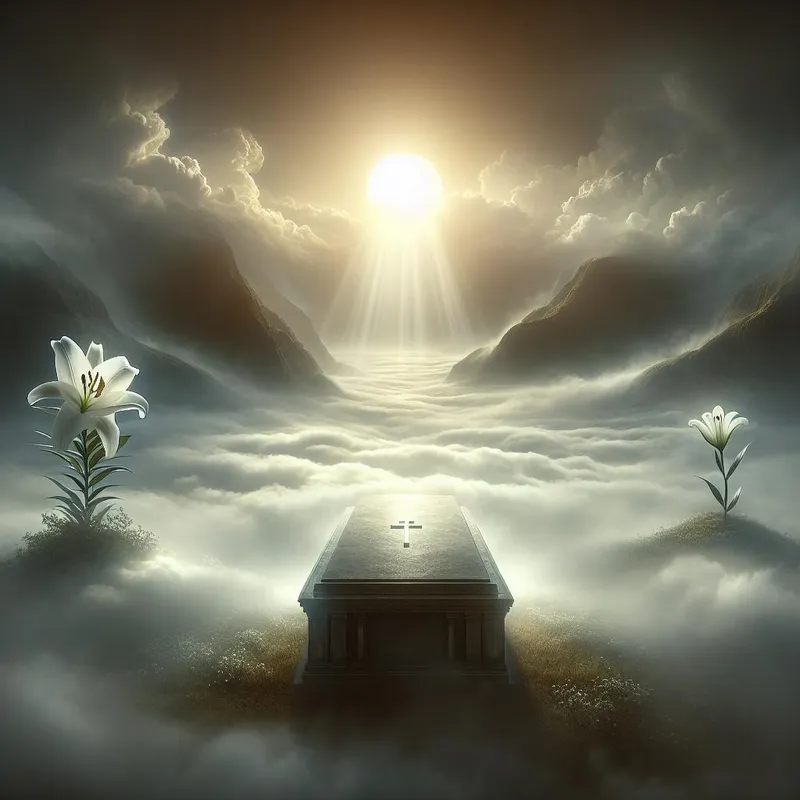
'Three Days of Redemption: A Christian Journey Towards Grace'
Posted on 13 June 2024
Three Days
The crucifixion and resurrection of Jesus Christ are central events in Christianity. According to the Bible, Jesus was crucified on the day of preparation, which is commonly believed to be a Friday, and rose again on the first day of the week, which is Sunday. However, there are different viewpoints regarding the exact timeline of these events. In this article, we will explore three perspectives: the Friday view, the Thursday view, and the Wednesday view.
The Friday View
The traditional view holds that Jesus was crucified on a Friday. According to this timeline, Jesus was killed in AD 30 on Passover, which fell on a Friday, known as Nisan 14 in the Jewish calendar. The Passover meal was eaten on this day, and it was also the time to prepare for the Feast of Unleavened Bread, which began the following day.
Mark 15:42 mentions that Jesus was crucified on "the day before the Sabbath." Supporters of the Friday view interpret this Sabbath as the weekly observance held on Saturday. After Jesus' crucifixion, the women followed His body to the tomb "late on Friday afternoon, the day of preparation, as the Sabbath was about to begin" (Luke 23:54). On Saturday (Nisan 15), the chief priests and Pharisees met with Pilate to have the tomb sealed and guarded (Matthew 27:62).
According to this perspective, Jesus spent three days in the tomb by reckoning part of a day as a full day. He was buried late on Friday (Day 1), remained in the tomb throughout Saturday (Day 2), and rose from the dead early on Sunday (Day 3). This interpretation aligns with verses such as Matthew 16:21 and Luke 9:22, which mention that Jesus would rise "on the third day."
Why This Matters
Understanding the timeline of Jesus' crucifixion and resurrection is important because it confirms the fulfillment of biblical prophecies and the significance of Jesus as the Passover lamb. By sacrificing Himself on Passover, Jesus became our ultimate Passover lamb, taking away our sins.
Think About It
Consider the significance of Jesus' sacrifice as the Passover lamb. How does this impact your understanding of His crucifixion and resurrection?
The Thursday View
An alternate view suggests that Jesus was crucified on a Thursday. According to this perspective, the day of preparation mentioned in Mark 15:42 refers to the day before the Passover, which was a high Sabbath (John 19:14). This view takes into account that there were two Sabbaths that week: the Passover Sabbath starting at sundown on Thursday and followed by the regular Sabbath starting at sundown on Friday.
Supporters of the Thursday view argue that Jesus' prophecy of three days and three nights in Matthew 12:40 includes both nights and days. If the crucifixion occurred on Thursday afternoon, all three days and nights are accounted for.
Luke 23:56 states that after seeing where Jesus was buried, the women went home to prepare spices and perfumes but rested on the Sabbath in obedience to the commandment. The Thursday view suggests that they could only purchase and prepare the spices after the Sabbath (the Passover Sabbath) and before the weekly Sabbath.
Advocates for a Thursday crucifixion also point to passages like John 2:19, where Jesus mentions raising the temple in three days, and Luke 24:21, where disciples on the road to Emmaus state that it is the third day since all these things happened. These passages indicate a crucifixion on Thursday.
Why This Matters
Understanding different perspectives on the timeline of Jesus' crucifixion helps us engage with biblical texts and consider various interpretations. While the day of the week may be debated, the central truth remains: Jesus died and rose again for our salvation.
Think About It
Consider how the Thursday view challenges your understanding of the timeline. How does this impact your perception of Jesus' sacrifice?
The Wednesday View
The Wednesday view proposes that Jesus was crucified on a Wednesday. This perspective also acknowledges that there were two Sabbaths that week: the Passover Sabbath starting Wednesday evening and the regular weekly Sabbath starting Friday evening.
Proponents of the Wednesday view argue that the women purchased spices after the Sabbath (the Passover Sabbath) and prepared them before the Sabbath. This suggests that there were two Sabbaths separated by a non-Sabbath day (Friday).
Supporters of this view believe that counting three days and three nights from Wednesday to Sunday fulfills Jesus' prophecy in Matthew 12:40. The timeline is as follows: early Thursday (Day 1), late Thursday (Night 1), early Friday (Day 2), late Friday (Night 2), early Saturday (Day 3), and late Saturday (Night 3).
It is worth noting that Luke 24:13 mentions that the disciples on the road to Emmaus encountered Jesus on "the same day" of His resurrection, implying a three-day count from Wednesday evening to Sunday morning.
Why This Matters
Exploring different views on the crucifixion timeline encourages us to engage with Scripture more deeply and consider alternative interpretations. Ultimately, our faith rests in the fact that Jesus died, was buried, and rose again to save us from our sins.
Think About It
Reflect on how the Wednesday view challenges traditional understandings of Jesus' crucifixion. How does this affect your perception of His sacrifice?
In conclusion, there are varying perspectives on the precise timeline of Jesus' crucifixion and resurrection. While each viewpoint presents its own arguments and interpretations of biblical passages, it is crucial to remember that the central truth remains unchanged: Jesus willingly gave His life as a sacrifice for our sins and rose again, offering us salvation and eternal life. Regardless of the specific day of the week, let us focus on the significance of Jesus' sacrifice and the hope we have through His resurrection.
